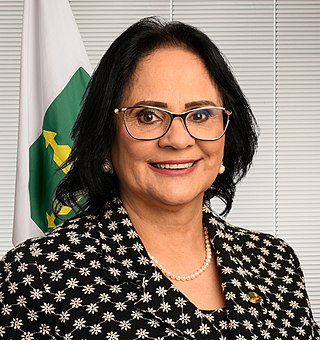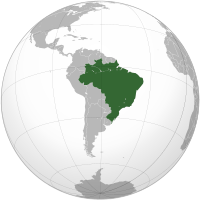Cidadania is a Brazilian political party. It was originally founded as the Popular Socialist Party by members of the former Brazilian Communist Party (PCB), as a centre-left social democratic and democratic socialist party. Despite its left-wing alignment, PPS moved to be opposition against the Workers' Party since 2004, forming alliances with centre-right parties, in particular the Brazilian Social Democracy Party (PSDB), and supporting the Impeachment of Dilma Rousseff. Later the party's National Convention adopted the new naming in March 2019, and it was later approved by the Superior Electoral Court that September. The party then began moving towards a more social liberal position akin to the third way.

Lesbian, gay, bisexual, and transgender (LGBT) rights in Brazil rank among the highest in the world. Same-sex couples in Brazil have enjoyed the same rights guaranteed to heterosexual ones since 16 May 2013, including marriage and adoption. On June 13, 2019, the Brazilian Supreme Court ruled that discrimination on the basis of sexual orientation and gender identity is a crime akin to racism.

Lesbian, gay, bisexual, and transgender (LGBT) rights in Angola have seen improvements in the early 21st century. In November 2020, the National Assembly approved a new penal code, which legalised consenting same-sex sexual activity. Additionally, employment discrimination on the basis of sexual orientation has been banned, making Angola one of the few African countries to have such protections for LGBTQ people.

The Ministry of Human Rights and Citizenship, formerly the Ministry of Woman, Family and Human Rights (2019–2022) and Secretariat for Human Rights of the Presidency of the Republic (1997–2015) is an office attached to the Presidency of Brazil. Its purpose is to implement, promote, and protect human rights, civic rights, and the rights of children, adolescents, women, families, the elderly, and the disabled.

Lesbians, Gays, Transsexuals and Bisexuals Collective Organization is a Spanish non-governmental association stated as a public utility and non-profit organization in Boletín Oficial del Estado which works actively for the rights of lesbians, gays, transsexuals and bisexuals. It is located in the surroundings of Chueca quarter in Madrid.
The Brazilian Gay, Lesbian, Bisexual, Travesti, Transsexual and Intersex Association, is a national network made up of 203 member groups, including about 141 gay, lesbian, and trans groups, and about 62 "collaborating" organizations which are involved with human rights and AIDS. Since July 2009, ABGLT has consultative status with the United Nations Economic and Social Council.
Transgender rights in Brazil include the right to change one's legal name and sex without the need of surgery or professional evaluation, and the right to sex reassignment surgery provided by Brazil's public health service, the Sistema Único de Saúde.

Anti-discrimination laws in Brazil are present in the Constitution of Brazil, in the labour law, in the child and adolescent law, in the ageing law, and in the penal code.

Lesbian, gay, bisexual, and transgender (LGBT) rights are liberal in Bahia. Homosexuality and same-sex marriage are legal in the state.
Sexual diversity or gender and sexual diversity (GSD), refers to all the diversities of sex characteristics, sexual orientations and gender identities, without the need to specify each of the identities, behaviors, or characteristics that form this plurality.
Brazil Without Homophobia is a non-governmental initiative launched in 2004 by the Special Secretariat for Human Rights meant to tackle homophobia through public policy.

Damares Regina Alves is a Brazilian lawyer and evangelical pastor.

The second presidency of Luiz Inácio Lula da Silva started on 1 January 2023, when he was inaugurated as the 39th President of Brazil. Lula was elected for a third term as President of Brazil on 30 October 2022, by obtaining 50.9% of the valid votes in the 2022 Brazilian general election, defeating his far-right predecessor Jair Bolsonaro. Lula is the first Brazilian president to ever be elected more than twice as well as being the oldest person to ever be elected president in Brazil.

The Ministry of Women, formerly the National Secretariat of Politics for Women, was created as a secretariat with cabinet-level during the first Lula da Silva administration, as a way to ensure that politics for women could have more attention. In 2019, it was fused with the Ministry of Human Rights and became the Ministry of Woman, Family and Human Rights (MMFDH), with an attribution to establish public politics for the enhancement of life of all women, LGBT people, indigenous people, black people of Brazil. The main goal of the Ministry is "[to] promote the equality between men and women and fight against any kind of prejudice and discrimination inherited from a patriarchal and excluding society."

Maria Aparecida Gonçalves is a Brazilian advertiser person, feminist activist, consultant in public politics of gender and violence against women and current Minister of Women.
Adriana Abreu Magalhaes Dias was a Brazilian feminist anthropologist, anti-fascist and activist for the rights of people with disabilities and rare diseases. Because of her work, Dias was nicknamed the "Nazi hunter".
Transgender history in Brazil comprises the history of transgender people in Brazil and their struggles and organization from the pre-colonial period to the modern day. Before Brazil's colonization, indigenous peoples respected various transmasculine and transfeminine third genders; colonization included public executions of trans people and the systematic imposition of the Western gender binary. In the late 1800s, there were repeated arrests of black travestis and occasional sensationalized news reports of travestis. By the 1920s there were popular drag queens and in the 1950s travestis became popular stars in the theater and revue shows. From the 1960s onward, LGBT periodicals publicly discussed the issues facing travestis and transsexuals.

The presidency of Fernando Henrique Cardoso began on January 1, 1995, with the inauguration of Fernando Henrique, also known as FHC, and ended on January 1, 2003, when Luiz Inácio Lula da Silva took over the presidency.












